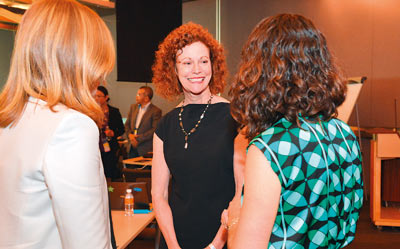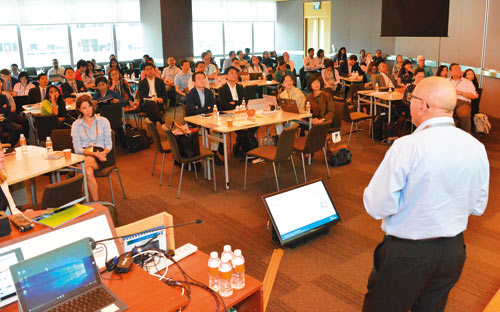4-year degrees obsolete as technology advances rapidly; lifelong learning the future

Mary Snapp (centre)
SINGAPORE – Not leaving people behind. This is the stated objective of Microsoft Philanthropies and if they’re committed to this task and implementing this goal by the letter, then the world is surely going to be a better place. What does it mean? Using technology to break through poverty barriers, racial discrimination, gender imbalance and equality imbalances. A tall order one might say; not for Microsoft however whose reach far supersedes any other corporate body across the world, for the simple reason that it has a powerful tool at its disposal: technology.
Consider this: More than 100 million students from 180 countries (just one event) have so far taken part in the
Hour of Code’ organised by www.code.org in partnership with Microsoft as a means of increasing access to computer science education; a sizable reach for a company founded by childhood buddies, Paul Allen and Bill Gates in 1975. Learning about the work of Microsoft Philanthropies through its June 27-29, 2016 ‘Enabling Opportunities Summit’ in Singapore resulted in a profound understanding on how technology can help disadvantaged communities to reach out and be counted with the rest of the world, improve the skills of differently-abled people and make elders in society more productive and acknowledged as equally responsible citizens as they age.

Participants at one of the sessions.
The conference brought together 50 non-profit organisations, about 10 government officials, representatives of Microsoft offices across Asia and senior management of Microsoft Philanthropies. Sipping a cup of tea during a break in the sessions on an upper floor of the Microsoft office, through the window I see the Singapore skyline with towering skyscrapers filled with technological savvy professionals and tools to boot, resonating with the message in the auditorium that technology is the driving force to empower the underprivileged, particularly rural women and create an inclusive world for all.
Through its philanthropic arm, Microsoft is investing assets to drive greater inclusion and empowerment of people who do not have access to technology and the opportunities it offers and enables. “As we do so, we will build on the foundation of Microsoft’s 30-plus years of giving, seeking new ways to achieve greater outcomes for a broader segment of the world’s population,” a publicity blurb says in the many literature on the global technology company that Gates built, not only making him the richest man in the world but also scaling up philanthropy to new heights.
Special village which Sri Lanka should emulate
Seeing is believing, literally as we find out when the 60-odd conference participants were taken to “The Enabling Village” a new space in Singapore for differently abled children and adults initiated by the Ministry of Social and Family Development and SG Enable Ltd, an agency dedicated to enabling persons with disabilities. People with different disadvantages move around freely; feel accepted for who they are and are valued for their contributions. The store in the complex has various handicraft, pictures, drawing and other craft made by those from the ‘village’.
The retail art gallery features resident artists, art workshops and merchandise by talented artists with special needs and organised by the Autism Resource Centre (ARC).
The supermarket provides an accessible shopping experience with barrier-free design, wheelchair-friendly pushcarts and specially trained staff. Soul Food is the restaurant which provides home-style modern European cuisine in a private dining setting. Chefs and stewards are young people who would never have had an opportunity in normal circumstances. As we sit down to dinner, a smart young girl approaches with a note pad and takes down our order. It take a while for the food to come – possibly to ensure that this group of 60+ ‘VIPs’ get the best meal – but when our fish course finally arrives, its nicely laid on a plate, tastes delicious and can compete with the best in a 5-star hotel!
Drawing on a computer
In two mobile vans, instructors provide different forms of learning through computers. In one demonstrated technique, a teacher simply stares at the screen as we watch in anticipation. The screen is blank; onlookers are puzzled. Then a line moves across the screen and starts drawing. By just moving her eyeball, the teacher controls the line and makes a perfect drawing, a technology to help those without limbs. Showcasing this facility for those with special needs on the eve of the Microsoft summit, was a perfect start to an interesting and engaging 36-hours of listening and learning how technology is bridging the gap in education and opportunities.
Also how technology can empower women and make them not only more productive and valued but also key decision makers in their communities. Coding! The name conjures difficult maths, testing diagrams, complicated numbers and an effort that I for one would not engage in. Maths has never been my forte, failing miserably in college. Today the calculator is a must-have tool when writing a complex economic story. It’s not as difficult, I am told, as explained during one session on coding. The Hour of Code event is an example of how children have taken to coding like a duck takes to water.
Coding the key
The Hour of Code is a global movement, we are told, reaching tens of millions of students in 180+ countries. Anyone, anywhere can organise an Hour of Code event. One-hour tutorials are available in over 45 languages. No experience needed and age group? From 4 to 104! The conference opened with Microsoft Philanthropies Corporate Vice President Mary Snapp saying that their mission is to empower every person on the planet to achieve more. “Delivering on this mission starts with great technology, but great technology alone is not enough. Microsoft Philanthropies is working to increase access for all youth, especially those from underserved communities, to learn computer science and develop the skills which are critical for their future.”
She dealt at length on various industrial revolutions to illustrate the power of technology and Microsoft’s advanced platforms and tools. If the first industrial revolution was about the steam engine and railroads, the next revolution was about industry powered by electricity and creation of the sewing machine. The next level, which is today, is Internet, ICT, Windows and the like; major advances with automation, electronic data, social entrepreneurship and efforts to provide Internet connectivity to women so they could work from home, all part of a process where connectivity will ensure deprived communities are not left behind. According to Klaus Schwab, Founder and Executive Chairman, World Economic Forum, the fourth industrial revolution is building on the third, the digital revolution that has been occurring since the middle of the last century.
It is characterised by a fusion of technologies that is blurring the lines between the physical, digital, and biological sphere. Snapp believes engineering and maths will provide the key to the next stage of development. That is reflected to some extent in the “Education to 2030” study done by The Economist Intelligence Unit (EIU) which found that with increasing use of technology, jobs of the future will demand a different mix of skills. “STEM (science, technology, engineering and mathematics) will feature prominently in that mix and the economies that perform best are those that, annually, graduate the most students with STEM degrees as a percentage of the overall labour force. By 2030, Russia, Australia, Israel and Turkey will see new STEM graduates equivalent to one per cent or more of the entire existing labour market,” the report said.
Teaching analytical and computer science skills
In fact, the EIU’s report shows that while 15 out of the 25 economies covered by the study are expected to raise public expenditure in education, schools today are not focused on teaching analytical and computer science skills. Part of a panel on why computer science education is important, Randeep Sudan, Adviser, Digital Strategy and Government Analytics, World Bank Group, spoke on how the labour landscape was changing with jobs being increasingly outsourced online.
He illustrated this argument pointing to research done by burning-glass.com which analysed 40,000 websites in 2015 and found 26 million jobs of which 7 million were in occupations that required coding skills. The company – Burning Glass Technologies – says it is reshaping “how the job market works, with data that identify the skill gaps that keep job seekers and employers apart and tools that enable both sides to bridge that gap and connect more easily.”
Another interesting piece of information from Sudan was about Xavier Niel, a 49 year-old French entrepreneur and businessman, who in 2013 set up a tech school for coders named 42 – sans teachers, books or tuition. Training is inspired by new modern ways to teach which include peer-to-peer learning while students don’t receive any official degree. The university is known to promote advanced knowledge, skills in computer programming and novel ways of thinking.
Says Sudan, “All you need for admission is your name, last name, birth name and taking an online test of logic.” This is the future of education. Christopher Clague, senior editor at the EIU who led the editing team for the “Education to 2030” study, said one of the issues raised is in the quality of graduates in India. There is quantity but not quality. Modern teaching methods, he says, should focus on teaching students how to think and not what to think.
4-year degree obsolete
Some of the issues that surfaced at the discussion were:
The 4-year degree in the US is under threat because technology is progressing very rapidly that what was studied two years ago has become obsolete. As a result, a large number of those enrolled didn’t complete a degree. Lifelong learning, defined as “all learning activity undertaken throughout life, with the aim of improving knowledge, skills and competences within a personal, civic, social and/or employment-related perspective”, is the new manthra of education.
The old model of getting a job and learning on the job, doesn’t work anymore. During a break in the sessions, the panelists and other speakers met the media to discuss the conference and its objectives. Microsoft Philanthropies Snapp said that the company aims to empower underserved communities to achieve more economically. “With the coming digital revolution we want to improve non-profit organisations to have tools and also create a high skilled workplace,” she said adding that creating a force of volunteers with high skills using the varied talents in the workplace was also among their goals.
It was the consensus view that the future lies with people with digital skills with the job market favouring those with these skills. For example, a marketing manager with a marketing degree would be less attractive than a marketer with a general degree but highly proven digital skills. The conference was an eye-opener on two fronts: the skills set required for countries like Sri Lanka and other middle income nations to compete on a level playing field with more advanced nations, and the charitable pursuits of a company that has changed the way the world thinks.
Will Microsoft deliver the goods of reaching out to all the people in the world and not leave anyone behind or become another do-gooder boosting a brand and creating wealth for the company at the expense of others? ”Wait and see,” says Snapp, philosophically. She believes Microsoft is on the threshold of a new era where the company will redefine philanthropy and the pursuit of philanthropy for society’s good. If they succeed in the next decade, I for one will cheer them to the winning post along with millions of other beneficiaries!!!


